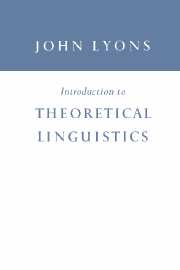Book contents
- Frontmatter
- Contents
- PREFACE TO THE 1995 EDITION
- 1 Linguistics: The Scientific Study of Language
- 2 The Structure of Language
- 3 The Sounds of Language
- 4 Grammar: General Principles
- 5 Grammatical Units
- 6 Grammatical Structure
- 7 Grammatical Categories
- 8 Grammatical Functions
- 9 Semantics: General Principles
- 10 Semantic Structure
- Notes and references
- Addenda
- Bibliography
- Table of symbols and notational conventions
- Index of proper names
- Index of subjects
- Frontmatter
- Contents
- PREFACE TO THE 1995 EDITION
- 1 Linguistics: The Scientific Study of Language
- 2 The Structure of Language
- 3 The Sounds of Language
- 4 Grammar: General Principles
- 5 Grammatical Units
- 6 Grammatical Structure
- 7 Grammatical Categories
- 8 Grammatical Functions
- 9 Semantics: General Principles
- 10 Semantic Structure
- Notes and references
- Addenda
- Bibliography
- Table of symbols and notational conventions
- Index of proper names
- Index of subjects
Summary
Introductory
Words, sentences, morphemes, phrases and clauses
Traditional linguistic theory operates with two fundamental units of grammatical description: the word and the sentence. Both of these units are given practical recognition in the conventions of different writing systems. For instance, in the various alphabetic systems employed for European languages, as well as for many other languages throughout the world, sentences are separated from one another by using special marks of punctuation (full-stop, question-mark, exclamation- mark) and by capitalizing the first letter of the first word in each sentence; and, within sentences, words are separated from one another by spaces. For this reason, the educated layman is familiar with the terms ‘word’ and ‘sentence’, and uses them freely in talking about language.
So far we have been employing the terms ‘word’ and ‘sentence’ without definition or explanation. We must now examine these terms in the light of the general principles discussed in the previous chapter, taking account of the implications that ‘word’ and ‘sentence’ carry in everyday usage and in traditional grammatical theory.
For reasons which will be explained later in this chapter, the classical grammarians were little concerned with the analysis of words into smaller elements. However, it is clear that, in many languages at least, such elements exist. For instance, the English word unacceptable is made up of three smaller units, each of which has a characteristic distribution: un, accept, and able.
- Type
- Chapter
- Information
- Introduction to Theoretical Linguistics , pp. 170 - 208Publisher: Cambridge University PressPrint publication year: 1968

